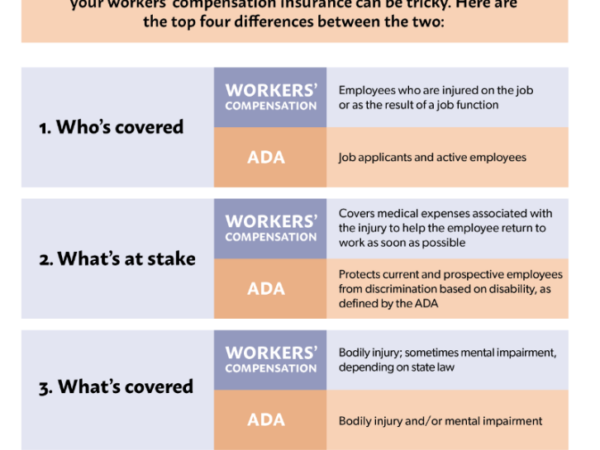
Post-traumatic stress disorder (PTSD) is a mental health disorder often triggered by a terrifying event. A person can develop PTSD from either experiencing the event or witnessing it. PTSD without physical injury is a complex claim to argue. It’s recognized under some workers’ compensation policies but is often limited to the military and first responders.
However, traumatic events such as active assailant incidents and the COVID-19 pandemic have increased awareness about workplace PTSD. Workers’ comp laws are evolving, but the coverage isn’t always straightforward.
Each state has different workers’ comp regulations
Workers’ comp is a form of insurance that provides wage replacement and medical benefits to employees injured on the job. When you accept a workers’ comp claim, the employee relinquishes their right to sue you for negligence.
State and federal laws, rules and regulations define who workers’ comp covers, what injuries and illnesses it covers and the specific benefits. In some states, workers’ comp laws don’t apply to independent contractors or certain types of employees, such as agricultural workers.
State and federal agencies oversee and enforce these laws, providing a framework for insurance companies to follow.
The inclusion of PTSD under workers’ comp coverage varies from state to state. States handle workers’ comp in a few ways:
- Some states don’t cover PTSD under workers’ comp. In these states, it’s intended to cover physical rather than mental issues.
- Other states recognize PTSD but only if a covered physical injury accompanies it.
- A few states allow for “mental-mental” or “mental-only” claims. These are legal terms that mean a psychological stressor caused the psychological injury. The eligibility criteria for these claims can be strict.
Many workers’ comp policies cover PTSD and other mental illnesses that accompany physical injuries. Treatment may be covered as part of the bodily injury since there’s a physical injury to stake the PTSD claim on.
Others oppose covering mental-only PTSD claims on the grounds that the diagnosis is subjective. A mental-only PTSD diagnosis relies on self-reported symptoms rather than objective symptoms like X-rays or laboratory test results.
However, more states are undertaking legislative steps to cover PTSD under workers’ comp policies.
An example of changing state legislation
Connecticut recently extended PTSD legislation to all workers if a mental health professional diagnoses PTSD as a direct result of a work-related event. The traumatic event must involve the employee witnessing or viewing the following:
- A deceased minor
- A death or an incident involving a death
- An injury resulting in death before or upon admission to a hospital, including employees who have to carry or treat an injured person
- A traumatic physical injury that results in the loss of a vital body part or function and permanently disfigures the victim
Connecticut’s law also includes employees who have to carry or have physical contact with and treat an injured person who dies before or upon admission to a hospital.
Other states have expanded their PTSD workers’ comp protections to include:
- First responders
- Dispatchers and 911 operators
- City, county and state employees, including child protection investigators
However, PTSD coverage remains inconsistent for other professions. For example, manufacturing and retail workers might not be covered even if they witness something horrific. Challenging a PTSD claim without an accompanying physical injury can get tricky.
Qualifying for a PTSD claim
An employee must demonstrate that the PTSD resulted directly from their job duties or workplace environment. The event that caused their PTSD is often required to be a single extraordinary incident compared to the usual conditions of employment.
Claims adjudicators may also consider whether the work environment posed a significant risk factor and could have foreseeably led to PTSD.
Workers need a diagnosis from a qualified mental health professional, such as a psychiatrist or psychologist. This diagnosis must prove the patient meets the criteria for PTSD.
If an employee’s claim is approved, workers’ comp usually covers:
- The cost of diagnosing their PTSD
- A portion of their lost wages if they missed work because of PTSD
- The cost of ongoing treatment, such as therapy and medication for PTSD
The specifics depend on the workers’ comp laws in your state.
What you can do about workplace PTSD
Avoid workplace injuries and illnesses by maintaining exemplary safety and wellness programs. It’s also your legal obligation to keep your employees safe. The Occupational Safety and Health Administration (OSHA) ensures employers comply with safety and wellness laws, including employee health and safety training and written company programs.
OSHA doesn’t have requirements related to stress in the workplace. But it does offer a Critical Incident Stress Guide to help employers create a plan for handling employee stress after they witness an injury, illness or fatality.
Consider adding a critical incident stress management plan to your overall risk management program. It’s not required, but it does show a good-faith effort.
Remember, OSHA rules are bare minimums for employee wellness, not gold standards. If you exceed OSHA standards, you operate from a safety-first, employee wellness mindset. Employees who feel heard and respected tend to stay with their employers longer. They’re also more productive and conscientious.
If that’s not enough incentive to remain compliant with health and safety initiatives, try OSHA’s Safety Pays tool and injury estimator. The direct and indirect costs of a workplace injury might surprise you.
Contact your agent and lawyer
PTSD coverage is an evolving landscape under complex workers’ comp laws. Increasing recognition of the relevance of employee mental health across industries is changing the view on what constitutes PTSD. Even so, the rules are inconsistent from state to state.
Call your agent and lawyer to discuss your state’s current workers’ comp legislation. They can clarify the ins and outs of your state. If your business has multiple locations, you must comply with each state’s laws.
This content is for informational purposes only and not for the purpose of providing professional, financial, medical or legal advice. You should contact your licensed professional to obtain advice with respect to any particular issue or problem.


